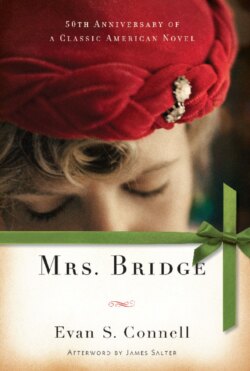Читать книгу Mrs. Bridge - Evan S. Connell - Страница 14
На сайте Литреса книга снята с продажи.
Оглавление8 • WHO CAN FIND THE CASPIAN SEA?
As time went on it became evident that Douglas was the most introspective of the three children, but aside from this—to his father’s disappointment—he appeared to be totally unremarkable. Mr. Bridge had hoped for a brilliant son, and though he had not yet given up that hope he was reluctantly adapting himself to the idea that his son was no prodigy. If Douglas amounted to anything in later life, he concluded, it would be less the result of brilliance than of conscientious effort.
Ruth, even more obviously, had no intention of relying on her brains; but Carolyn, as soon as she entered kindergarten, began to make a name for herself, and very shortly was known as the brightest child in the class. Furthermore she appeared to understand her own superiority and when, through some mischance, another child equaled or exceeded her for a moment, Carolyn would grow furiously vindictive, and was not above lying or cheating in order to regain her position at the head of the class, so that by the time she was in the third grade she was beginning to be envied and disliked by her classmates and carefully observed by her teachers. It was no surprise to anyone when she was allowed to skip the second half of the third grade.
The teacher of Carolyn’s fourth-grade class was a young lame woman named Bloch, who wore eye shadow and mascara and had one rather strange habit: every day she would call one of the children to her desk, give the child a comb, and then, bowing her head and shutting her eyes, she would instruct the child to take the pins out of her hair. Her hair was thick and greasy and hung down to her waist.
“Who can find the Caspian Sea?” she would murmur, and the child behind her would begin combing.
“Who knows where to find the Caspian Sea?” she would ask again, and without opening her eyes she would say, “Albert Crawford knows.”
Then the boy she had named would walk to the great green and blue map pulled down over the blackboard, and with the pointer he would locate the sea.
“Carefully, dear,” she would whisper if the comb snarled, but even then she seemed not displeased.
Although the children did not like this curious task they seldom thought of it once they were out of class. Carolyn, however, happened to mention at home that she had been chosen that morning. Mrs. Bridge was aghast; she had never heard of Miss Bloch’s habit. After questioning Carolyn and becoming convinced it was the truth, she resolved to telephone the school and report the incident to the principal, and yet, for some reason, she could not do it. Several times she picked up the telephone, shivering with disgust, but each time she put down the receiver with an expression of doubt and anxiety; she decided it would be better to visit the principal’s office, and yet this, too, was beyond her. She did not know why. In the end she told Carolyn that if she was ever again called upon to comb the teacher’s hair she was to refuse. Having done this, Mrs. Bridge told herself the teacher was no longer a threat and the entire affair, therefore, was closed. And so it was. Carolyn was not called upon for the remainder of the term, and the following September she had a different teacher. There were times later on when Mrs. Bridge wondered if she had done the right thing; she wondered if Miss Bloch was still calling children to comb her hair, and when Douglas entered fourth grade she waited anxiously to learn who his teacher would be. It was not Miss Bloch; if it had been she would have gone to the principal and demanded that something be done. But it was not, and Mrs. Bridge, who disliked making trouble for anyone, was greatly relieved, and found that she was no longer obliged to think about the matter.
